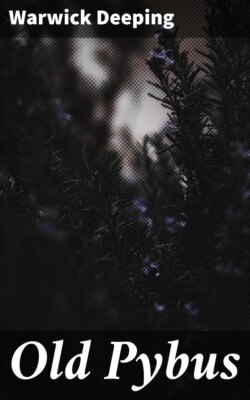Читать книгу Old Pybus - Warwick Deeping - Страница 28
На сайте Литреса книга снята с продажи.
2
ОглавлениеTable of Contents
When, after hurrying through his tea, Lance went out into the hall, his grandfather was absent. He strolled to the door, filled and lit a pipe, and considered the situation. Too direct an approach would appear clumsy. If he waited it was probable that his grandfather would return to his place by the brass gong, but how public would be the opportunity! How could you ever begin to talk intimately to an hotel “boots” in such a place?
Well, why not explore? He might happen upon his grandfather in one of the passages, or in the coaching yard; he could get into conversation with him, ask him about the castle. The way to the castle ruins lay through the Saracen yard. Lance followed the inspiration, but it failed at first to show him that little old figure in the alpaca coat. He strolled to the end of the yard, past a group of loitering chauffeurs who were chaffing one of the Saracen maids. He both saw and heard a fluttering of wings, and, rounding the red angle of an old brick coach-house, came suddenly upon his grandfather, the centre of a cloud of birds. Old Pybus was feeding his pigeons.
Lance’s head went up. He had a way of throwing it back when anything arrestive—a face, a landscape, or a picture—caught his attention. His eyes lit up, and in the smile of them there was a sudden quality of tenderness. Father Time and the pigeons! He saw one bird perched like a living crest on the old man’s white head. The birds were on his hands and shoulders and round his feet, and old Pybus’s face wore an absorbed and meditative smile.
Lance had paused, and when he walked slowly on, it was with a feeling of exultation. Here was his chance, and what a chance! It seemed to him that he was going to speak to someone who straightway would be a friend, an old man whose hands were stretched out to these fluttering birds. How unexpected and how suggestive! But would the birds be shy of a stranger?
Again he paused, standing a little way off.
“Shall I frighten them?”
Old Pybus looked up and round.
“You, sir? No. They are only shy of children.”
“The catapult boy. Little beasts.”
“I was one, sir. It’s natural—at that age. What’s natural—has to be thought of.”
Lance drew nearer.
“Wonder if they’ll come to me?”
“Hold out your hands, sir.”
“But there’s nothing in them. Wouldn’t that be swindling?”
Old Pybus gave him a quick attentive look.
“There’s a piece of bread in my coat pocket. Right hand side. You can have it.”
“That’s very good of you,” said Lance with eyes that saw John Pybus as his sons had never seen him.
He felt for the bread in his grandfather’s pocket, and standing beside him and crumbling it became a part of the cloud of birds. His impressions were quick and vivid. The birds had no fear of him; they settled upon his wrists and shoulders even as they settled on his grandfather’s, and it seemed to Lance that he and his grandfather were sharing some beautiful rite.
“You have made them very trusting.”
“I have fed them like this for seven years.”
“Every day?”
“Winter and summer—but in winter—I feed them before dinner.”
“Where do they come from?”
“Our pigeon lofts and the castle. The castle’s full of the blue birds.”
“I was going to look at the castle. Can I get to it down this yard?”
“Yes, sir, past my cottage and over the field.”
Lance wanted to say to him, “Don’t call me sir. It is I who ought to call you sir.”
“Is that your cottage?”
“Yes, sir.”
“Looks out on the castle.”
“It does. The barbican used to be there in the old days. They have filled up the ditch.”
“Very peaceful. A place to read or write in.”
“That’s so,” said his grandfather; “I read a lot. Books stay with you.”
Lance, with a smiling softness of the eyes, looked down at his grandfather. But inwardly he was looking up to him. What a man of surprises! With that venerable head and thoughtful face of his, full of the humility of service, yet resolute in his pride, with birds and books for his friends, and that ruin close to his windows.
“What books do you read, sir?”
The “sir” slipped out, and old Pybus’s blue eyes gave a curious flicker. This young man was unusual, very unusual. There was something about him....
“Solid books—most of them. I read a lot of poetry, Blake and Whitman.”
“Blake’s great. And novels?”
“A few. Conrad. There aren’t any more Conrads left for me to read. And he’s dead.”
“I know that feeling. And Hewlett’s dead. What a book—‘The Forest Lovers!’”
“‘Rest Harrow’ was bigger.”
“Different. And what a figure—with his flowers and his shepherds and his Wiltshire downs!”
“Talking of figures—Hudson—now.”
“Ah, Hudson,” said Lance, with a little thrill in his voice.
And—then—suddenly—they looked at each other, and in that look there was a kindling of the emotions, a question, a wonder. Each had a feeling of subtle infection, of a drawing together, of some mysterious spiritual relationship. To Lance, the thing was becoming exquisitely real. For the old man the feeling had a disturbing, puzzling strangeness.
“Care to see my books?”
“I’d love to.”
“I’m free from four till six. They treat me very well here. A lad comes in to help.”
“I’m glad of that,” said Lance.
His grandfather’s blue eyes seemed to grow big and strange. Why did he say he was glad? And he was glad. You caught the vibrations of it—in his voice.
